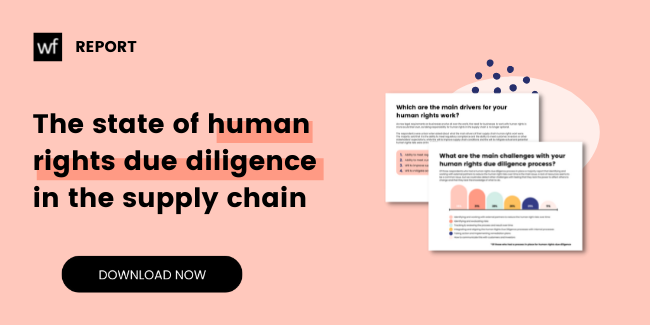Responsible business conduct in uncertain times: why human rights due diligence is key to minimizing supply chain risks

We find ourselves in uncertain times. Across the globe, various ongoing events, such as the war in Ukraine, are causing instability and undermining human rights. The consequences of instability for human rights can be obvious – the killing of civilians during armed conflict, for instance, constitutes a clear violation of the right to life. Other uncertainty-induced human rights impacts are more subtle and avoiding them requires vigilance.
With greater risk comes greater responsibility
Even under normal circumstances, companies can impact just about any human right - from the right to health to the right to family life. As a rule of thumb, the longer the supply chain, the more complicated ensuring compliance with human rights gets. For companies with global supply chains, preventing and mitigating human rights risks can be quite a challenge. And in uncertain times, it becomes all the more demanding as businesses face heightened human rights risks in their supply chains. But, it’s a challenge that both can and should be overcome - and not just out of a sense of moral obligation.
Human rights risks, left unaddressed, quickly translate into reputational, financial, and - increasingly - legal risks for companies. Simply put, companies that fail to meet their human rights responsibilities may face serious consequences. This is why risk management tools are necessary - enter human rights due diligence.
Human rights due diligence: no longer a “nice to have”
All business enterprises have a responsibility to respect human rights. Under the United Nations Guiding Principles on Business and Human Rights (UNGPs), companies are required to develop human rights due diligence processes to identify, prevent, mitigate and account for how they address their impacts on human rights.
The UNGPs, which were adopted in 2011, paved the way to a constantly increasing number of regulatory frameworks requiring companies to undertake human rights due diligence. Across the globe, regulatory requirements are emerging, shifting a resilient human rights due diligence process from a “nice to have” to a “need to have”.
The need to have an adequate process in place further increases in times of crisis. For instance, due to the heightened human rights risks in conflict-affected areas, businesses are expected to conduct enhanced human rights due diligence. Under normal circumstances, businesses may have ample time to develop human rights due diligence processes. In times of crisis, however, there is seldom much time to spare. Recognising this, Business for Social Responsibility has developed a rapid human rights due diligence tool which helps companies conduct due diligence when time is of the essence.
The OECD Due Diligence Guidance for Responsible Business Conduct: six steps to follow
Human rights due diligence laws predominantly reference the OECD Due Diligence Guidance for Responsible Business Conduct as the procedure to follow.
The OECD human rights due diligence procedure:
- Develop, implement, and communicate a policy on human rights due diligence
- Develop a process to assess and identify the most significant risks within operations, suppliers, and business relationships
- Take action on the most significant risks & develop a remediation plan to cease, prevent and mitigate risks
- Track the implementation and results to evaluate the effectiveness of due diligence procedures
- Communicate human rights due diligence procedures, risks, activities, and findings to stakeholders
- Cooperate with other parties to enable remedy
Ensure resiliency with Worldfavor
Keeping track of your company’s human rights impacts throughout the supply chain, while at the same time navigating a complex and constantly changing legal landscape, is hardly a walk in the park. Luckily, there are innovative digital tools that can help you build the resilience of your business – by both ensuring compliance with due diligence legislation and enabling supply chain transparency.
Worldfavor empowers you to make smart and sustainable business decisions and comply with human rights due diligence. Take the first step towards improving your human rights due diligence procedure – book a demo with Worldfavor today.
Related blog posts you might like:






%20as%20the%20deadline%20approaches.%20Learn%20about%20compliance%20requirements%2c%20potential%20delays%2c%20and%20key%20updates..png)

